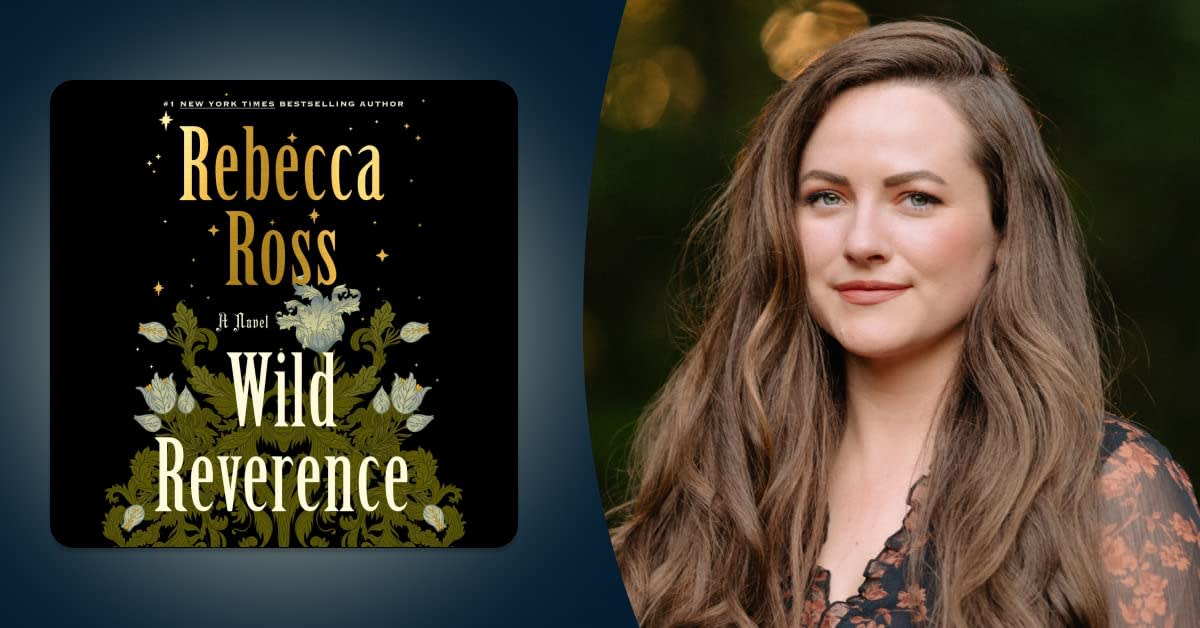Before Iris and Roman, before enchanted typewriters and love letters in wardrobes, there was Wild Reverence. In this prequel set 600 years before the Letters of Enchantment duology, Rebecca Ross transports listeners back to Cambria at a time when gods ruled, magic was power, and destinies were shaped in dreams. We caught up with Ross to talk about dream-born romance, morally gray allies, the rise of a young goddess, and the moment that ties this story to the world we first fell in love with.
Patty K. Rivera: Wild Reverence takes place in the same world as Divine Rivals but tells a completely new story set 600 years earlier. What made this point in history the right place to step back into this world?
Rebecca Ross: I wanted to show the world of Cambria when the gods were still very much alive and thriving, when magic was a game of power. I wanted to show how the gods lived in their courts above and below, and to bring these places—which had once been at the peripheral in Divine Rivals—to the forefront. There was still so much to explore, and readers were likewise keen to learn more about the Skywards and Underlings. They also wanted to discover where the enchantment of the typewriters originated from, and I wanted to show that to them. Setting the story back in time made sense to me, especially when the characters and the plot for Wild Reverence came together.
Early in the story, Zenia’s confidants become Matilda’s, and she gains important allies like Bade, and Alva. How did you decide which early relationships would shape the course of her journey?
I am a discovery writer at heart, so when it came to building those important relationships for Matilda, they happened organically. Bade was not even a character in the first draft! He came about in the second round of revisions, which is wild to think about because he plays such a vital role in Matilda’s story arc. Alva is mentioned in the Letters of Enchantment series, and I thought it would be a nice nod to the original duology to bring her back and show what it was like when she was at the height of her power. I loved this idea of her slipping dream scrolls to Matilda, in the hopes that she could potentially influence and control her. Of course, Matilda is more strong-willed than that, but I think opening the novel in Matilda’s youth made for an engaging beginning with quite a few promises: will Matilda become like Alva and Bade, her childhood allies who mortals fear, or will she break the mold and choose her own path, even if it leads to heartache?
The romance between Matilda and Vincent begins in dreams and spans years and realms. How did you approach building that connection and deciding when it would cross into the waking world?
I had to think of a way for Vincent and Matilda to meet early on in the story, since they come from vastly different worlds. Dreams already played an important role in the book, and I thought, “Why not have him dream of her?” I was intrigued by this element of their relationship. This idea of souls wandering in sleep, and having the chance to cross paths. I also wanted them to meet face-to-face when they were young, when the world felt soft and full of hope, and then have them meet again when they are older, reserved, jaded, and bear inner scars and wounds. How different those interactions are when compared to each other, but both scenes are favorites of mine; when I was writing them, the words flowed out of me.
The story moves between immortal courts, mortal lands, and quiet moments between two people. How did you balance those sweeping and intimate scenes?
I enjoy writing books with tension and action that gradually rises. A slow but steadily burning story, with an inferno in the final act. I also favor character-driven stories, although I cannot deny how much I love it when a plot twist takes me by surprise, as a reader and as a writer. I also revel in writing those quieter, intimate moments between characters, where emotional depth can be explored. I often envision writing a book is like climbing a mountain with many stops along the way to rest, recover, and enjoy the view.
So I suppose that is how I strike a balance. I think it’s also intuitive; years of reading and analyzing literature has helped me learn storytelling beats, and when to drive a story forward with action and when to draw out those quieter, emotional moments.
Wild Reverence immerses listeners deep into the world politics of gods and mortals. What part of that world was the most fun to bring to life?
It was a pleasure to fully bring the Skyward and Underling realms to life—to let my imagination roam free—as well as have the space to delve deeper into the magic of the gods. When I wrote Divine Rivals and Ruthless Vows, I left many doors cracked open in the world, because I knew there was rich soil here that I could garden. There was so much more to explore, but I needed another novel to do it proper justice. It was also rewarding to write an immortal character like Matilda, a goddess who carries words and hopes and her own dreams of what the world could be, and show how her magic and life impacts Iris and Roman, many years later. It felt like a full circle moment when I wrote the epilogue of Wild Reverence, and I am excited for listeners to experience it.




